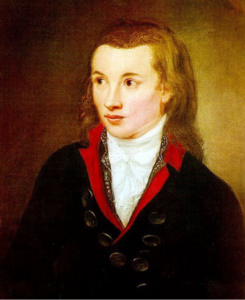Night hymn
(Poet's title: Nachthymne)
Set by Schubert:
D 687
[January 1820]
Hinüber wall ich,
Und jede Pein
Wird einst ein Stachel
Der Wollust sein.
Noch wenig Zeiten,
So bin ich los,
Und liege trunken
Der Lieb im Schoß.
Unendliches Leben
Wogt mächtig in mir,
Ich schaue von oben
Herunter nach dir.
An jenem Hügel
Verlischt dein Glanz,
Ein Schatten bringet
Den kühlenden Kranz.
O, sauge, Geliebter,
Gewaltig mich an,
Dass ich entschlummern
Und lieben kann.
Ich fühle des Todes
Verjüngende Flut,
Zu Balsam und Äther
Verwandelt mein Blut.
Ich lebe bei Tage
Voll Glauben und Mut
Und sterbe die Nächte
In heiliger Glut.
I am on a journey to the beyond,
And each pain
Will then become a stab
Of ecstasy.
In a very short time
I shall have been set free,
And I shall lie drunk
In the lap of love.
Endless life
Is surging powerfully within me;
From above I shall look
Down towards you.
On that mound
Your image fades –
A shadow creates
A cooling wreath.
Oh, beloved, absorb
Me powerfully
So that I can fall asleep
And so that I can love.
I can feel death’s
Rejuvenating tide,
Into balsam and ether
My blood is being transformed.
By day I live
Full of faith and courage,
And during the nights I die
In a sacred glow.
All translations into English that appear on this website, unless otherwise stated, are by Malcolm Wren. You are free to use them on condition that you acknowledge Malcolm Wren as the translator and schubertsong.uk as the source. Unless otherwise stated, the comments and essays that appear after the texts and translations are by Malcolm Wren and are © Copyright.
☙
Themes and images in this text:
Balm and balsam Blood Courage Eternity Ether Fire Floods and tides Gazes, glimpses and glances Graves and burials Here and there High, low and deep Hills and mountains Lap, womb (Schoß) Night and the moon Pain Rejuvenation Serenades and songs at evening Shade and shadows Sleep Thorns and pricking Wreaths and garlands
Here and there; life and death; pain and pleasure; being awake and falling asleep; spirit and flesh; day and night: the dichotomies are repeatedly emphasised in order to underline the poet’s belief that opposites are now being fused or even inverted. This is a love that will be consummated in death, and also a death that offers rejuvenation. On one level we are reading the final words of someone approaching death, but we are also aware that this is at the same time a sensual love poem. There are repeated references to surges and overflowing passions; the climax is an orgasmic death ‘in a sacred glow’.
Novalis was drawing on a long tradition of mystical writing which used eroticism as a metaphor for the union of the human spirit with the divine, but what is novel here is the total absence of any explicit reference to Christ or God as the love object. The beloved is addressed simply as ‘Geliebter’, beloved. The old distinction between the sacred and the secular seems to be another of the dichotomies that is being challenged. Physical love IS spiritual love, just as death (in the poet’s view) IS life.
☙
Original Spelling Nachthymne Hinüber wall' ich, Und jede Pein Wird einst ein Stachel Der Wollust seyn. Noch wenig Zeiten, So bin ich los, Und liege trunken Der Lieb' im Schooß. Unendliches Leben Wogt mächtig in mir; Ich schaue von oben Herunter nach dir. An jenem Hügel Verlischt dein Glanz - Ein Schatten bringet Den kühlenden Kranz. O! sauge, Geliebter, Gewaltig mich an, Daß ich entschlummern Und lieben kann. Ich fühle des Todes Verjüngende Flut, Zu Balsam und Aether Verwandelt mein Blut - Ich lebe bey Tage Voll Glauben und Muth, Und sterbe die Nächte In heiliger Glut.
Confirmed by Peter Rastl with Schubert’s source, Novalis Schriften. Herausgegeben von Ludwig Tieck und Fr. Schlegel. Dritte Auflage. Zweiter Theil. Berlin, 1815. In der Realschulbuchhandlung, pages 7-8; with Athenaeum. Eine Zeitschrift von August Wilhelm Schlegel und Friedrich Schlegel. Dritter Band. Berlin, 1800. bei Heinrich Frölich, pages 194-195; and with Novalis Schriften. Herausgegeben von Friedrich Schlegel und Ludwig Tieck. Zweiter Theil. Berlin, 1802- In der Buchhandlung der Realschule, pages 90-91.
To see an early edition of the text, go to page 7 [17 von 308] here: http://digital.onb.ac.at/OnbViewer/viewer.faces?doc=ABO_%2BZ176643708


